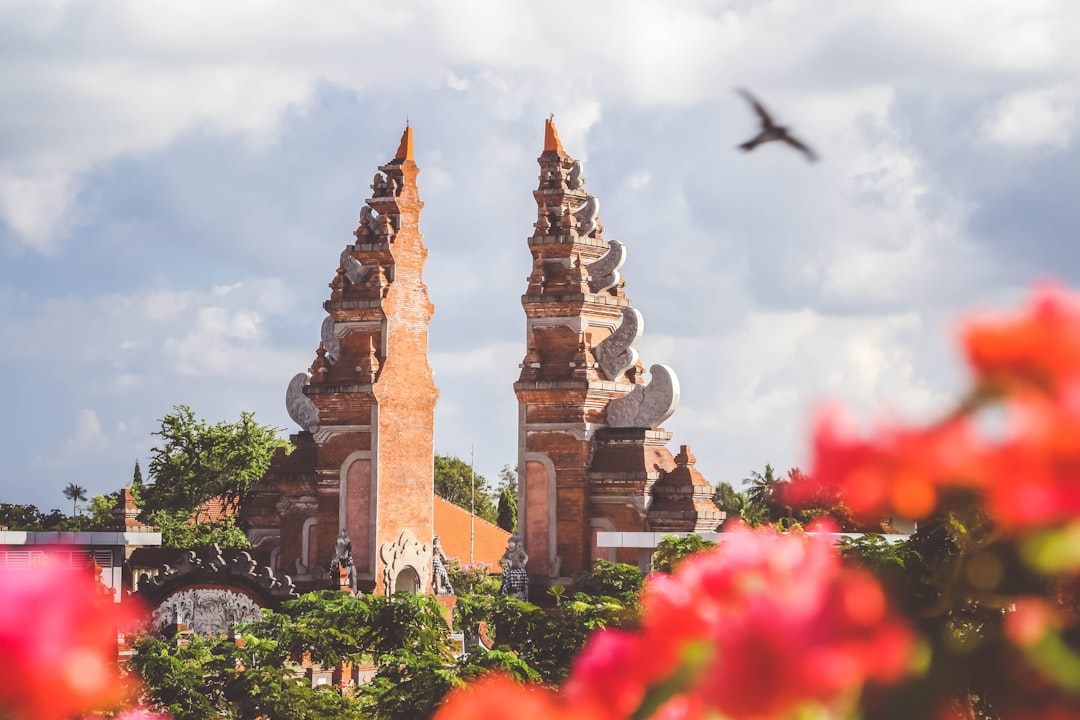7 Visa Hacks for Extending Your Stay in Bali Without Breaking the Bank
7 Visa Hacks for Extending Your Stay in Bali Without Breaking the Bank - Leveraging the Bali Visa on Arrival Extension

The Bali Visa on Arrival (VoA) can be extended for an additional 30 days, allowing travelers to extend their stay in Bali without breaking the bank.
To initiate the extension process, travelers must meet certain requirements, including having a valid VoA with at least 10 days remaining, a passport with at least six months of validity, and a return or onward travel ticket.
While the process can be done independently at one of the three immigration offices in Bali, it's recommended to use an agent, especially if time is tight.
The average cost for a visa extension, including the agent's services and immigration office fee, ranges from 800,000 to 1,050,000 Indonesian Rupiahs.
The Bali Visa on Arrival (VoA) extension process can be completed entirely online, allowing travelers to avoid the hassle of in-person visits to immigration offices.
Fingerprinting is a mandatory step during the VoA extension process, and applicants will be given a specific appointment date around 7 days after submitting their passport.
Travelers holding the B211 visa can extend their stay in Bali twice, for a total duration of 60 days, while the standard VoA can only be extended once for an additional 30 days.
The average cost of a Bali VoA extension, including the agent's services and immigration office fee, ranges from 800,000 to 1,050,000 Indonesian Rupiahs, making it a relatively affordable option for extending one's stay.
To initiate the VoA extension process, applicants must have a valid VoA with at least 10 days remaining, a passport with a minimum of six months of validity, and confirmed onward travel arrangements.
While the VoA extension process can be handled independently, utilizing the services of a local agent is highly recommended, especially for travelers who are running short on time before their visa expires.
What else is in this post?
- 7 Visa Hacks for Extending Your Stay in Bali Without Breaking the Bank - Leveraging the Bali Visa on Arrival Extension
- 7 Visa Hacks for Extending Your Stay in Bali Without Breaking the Bank - Exploring the 60-Day Tourist Visa Option
- 7 Visa Hacks for Extending Your Stay in Bali Without Breaking the Bank - Applying for a Social Visa- A Long-Term Solution
- 7 Visa Hacks for Extending Your Stay in Bali Without Breaking the Bank - Utilizing Local Visa Agency Services for Convenience
- 7 Visa Hacks for Extending Your Stay in Bali Without Breaking the Bank - Understanding the Multiple-Entry Business Visa Advantages
- 7 Visa Hacks for Extending Your Stay in Bali Without Breaking the Bank - Navigating the KITAS Process for Extended Stays
7 Visa Hacks for Extending Your Stay in Bali Without Breaking the Bank - Exploring the 60-Day Tourist Visa Option
The 60-day tourist visa for Bali allows visitors to stay in Indonesia for a full 60 days, but it cannot be extended further.
Alternatively, travelers can opt for a Visa on Arrival (VOA) and then extend it for an additional 30 days, though once the 60-day period is up, no more extensions are possible.
To stay longer than 60 days, individuals can apply for a social visa, multiple-entry business visa, or a KITAS limited stay work permit.
The 60-day tourist visa for Bali is a single-entry visa, meaning it cannot be extended beyond the initial 60-day period.
This is in contrast to the Visa on Arrival (VOA) option, which can be extended for an additional 30 days.
Applicants for the 60-day tourist visa must apply for it prior to arriving in Bali, as it cannot be obtained upon arrival like the VOA.
This adds an extra step in the visa application process.
The 60-day tourist visa for Bali costs significantly more than the VOA, with fees ranging from $50 to $100 depending on the country of origin, making it a less budget-friendly option for long-term stays.
Travelers who wish to stay in Bali for longer than 60 days have the option to apply for a social visa, multiple-entry business visa, or a KITAS limited stay work permit, each with their own unique requirements and benefits.
The online extension process for the VOA allows travelers to avoid the hassle of visiting immigration offices in person, potentially saving time and effort during their stay.
Repeated "visa runs" by leaving and re-entering Indonesia every 60 days can be a cost-effective way to extend one's stay in Bali, though this strategy may be subject to scrutiny by immigration authorities.
The fingerprinting requirement during the VOA extension process is a unique and somewhat inconvenient step that travelers should be prepared for, potentially adding an extra layer of complexity to the visa extension process.
7 Visa Hacks for Extending Your Stay in Bali Without Breaking the Bank - Applying for a Social Visa- A Long-Term Solution

The Social Visa, or B211 visa, remains a viable option for those seeking an extended visit of up to 6 months.
This visa requires an application process through the Indonesian consulate in the applicant's home country, including documentation such as a sponsor letter and flight itinerary.
While the initial 60-day stay period is fixed, the visa can be extended every 30 days at the local immigration office, providing flexibility for those wishing to prolong their Bali experience.
However, the Social Visa cannot be extended once the applicant leaves Indonesia, emphasizing the importance of careful planning and adherence to the visa requirements.
The Social Visa, also known as the B211 visa, is the only long-term visa option that allows foreigners to stay in Bali for up to 6 months without the need for frequent visa runs.
The Social Visa application process can be completed entirely online, eliminating the need for in-person visits to the Indonesian consulate in the applicant's home country.
Applicants for the Social Visa must provide a sponsor letter, which can be obtained from their employer or a local Indonesian company they are affiliated with, demonstrating their purpose for staying in Bali.
The Social Visa is a single-entry visa, meaning that once the applicant leaves Indonesia, the visa cannot be extended, requiring them to reapply if they wish to return.
The cost of a Social Visa ranges from $100 to $132, depending on the applicant's country of origin, making it a more affordable long-term visa option compared to some other visa types.
During the 6-month stay, Social Visa holders can apply for 30-day extensions at the Immigration Office in Bali, allowing them to maximize their time in the island paradise.
Applicants for the Social Visa must have a passport with at least 12 months of validity remaining, ensuring they can fully utilize the extended stay duration.
The Social Visa application process is designed to be straightforward, with the Indonesian consulate typically processing applications within 3-5 business days, providing a quick turnaround for travelers.
7 Visa Hacks for Extending Your Stay in Bali Without Breaking the Bank - Utilizing Local Visa Agency Services for Convenience
In Bali, visa agencies offer a convenient option for tourists looking to extend their stay.
These agencies handle the entire visa extension process, including submitting forms online, to save visitors multiple trips to the immigration office.
The cost for a visa extension through a local agency typically ranges from 800,000 to 1,050,000 Indonesian Rupiahs, which covers the agent's services and the immigration office fee.
The use of local visa agencies in Bali can be an efficient and hassle-free way for travelers to extend their stay, as these agencies manage the entire process on the visitor's behalf.
While the cost is slightly higher than handling the extension independently, the time and effort saved may make it a worthwhile investment for some tourists.
Visa agencies in Bali can handle the entire visa extension process, including online submission forms, to save tourists from making multiple trips to the immigration office.
The typical cost for a visa extension in Bali, including the agent's services and immigration office fee, ranges from 800,000 to 1,050,000 Indonesian Rupiahs.
The Bali Visa on Arrival (VoA) extension process can be completed entirely online, eliminating the need for in-person visits to immigration offices.
Fingerprinting is a mandatory step during the VoA extension process, and applicants will be given a specific appointment date around 7 days after submitting their passport.
Travelers holding the B211 visa can extend their stay in Bali twice, for a total duration of 60 days, while the standard VoA can only be extended once for an additional 30 days.
The average cost of a Bali VoA extension, including the agent's services and immigration office fee, is significantly lower than the cost of a 60-day tourist visa, which ranges from $50 to $
Several highly-rated visa agencies in Bali, such as JTG Travel and Bali Prime Visa Agency, can assist with problem-free visa extensions, ensuring a smooth process for travelers.
The new e-visa system in Bali offers a convenient option for obtaining visas and extensions, with several local visa agents providing comprehensive services.
In addition to VoA extensions, visa agencies in Bali can also assist with obtaining other types of visas, such as work permits, social visas, retirement visas, and business visas, each with their own unique requirements and costs.
7 Visa Hacks for Extending Your Stay in Bali Without Breaking the Bank - Understanding the Multiple-Entry Business Visa Advantages

The multiple-entry business visa (MEBV) in Indonesia offers significant advantages for frequent business travelers to Bali.
With the ability to enter the country multiple times within the visa's one-year validity period and stay up to 60 days per visit, the MEBV streamlines business operations and reduces the hassle of repeated visa applications.
At a cost of around $615 USD, the MEBV is a cost-effective solution compared to applying for a new visa each time, making it a valuable option for entrepreneurs, investors, and professionals conducting business in Bali.
Indonesia's Multiple-Entry Business Visa (MEBV) allows holders to enter the country multiple times within the visa's validity period, enabling them to engage in various business activities, attend meetings, and negotiate deals.
The MEBV has a validity period of one year, allowing frequent travelers to Bali to make multiple trips within that timeframe without the need to apply for a new visa each time.
Extensions for the MEBV can be done twice for 60 days each, granting a maximum stay of up to 180 days in Bali, providing greater flexibility for business activities.
Unlike the standard Visa on Arrival (VOA), which can only be extended once for an additional 30 days, the MEBV allows for two 60-day extensions, almost doubling the total stay duration.
The cost of a MEBV in Bali is approximately $615 USD, which is significantly higher than the VOA or 60-day tourist visa options, but can be a more cost-effective choice for frequent business travelers.
The MEBV application process can take 2-14 working days, depending on the completeness of the application and the daily quota, underscoring the importance of planning ahead for business travelers.
While the MEBV is designed for business purposes, it can also be leveraged by entrepreneurs, investors, and professionals who frequently travel to Bali for various business-related activities.
The MEBV is a single-entry visa, meaning that once the holder leaves Indonesia, the visa cannot be extended, and they would need to reapply if they wish to return.
Compared to applying for a new visa every time, the MEBV can be a more cost-effective option for frequent business travelers to Bali, making it a viable solution for those who need to make multiple trips to the island.
7 Visa Hacks for Extending Your Stay in Bali Without Breaking the Bank - Navigating the KITAS Process for Extended Stays
The KITAS (Limited Stay Work Permit) is a viable option for individuals seeking to extend their stay in Bali beyond the typical 60-day limit.
The KITAS provides a legal basis for non-Indonesians to reside in the country for an extended period, whether for work, retirement, or other purposes.
The application process involves obtaining a VITAS limited stay visa from the Indonesian embassy or consulate in one's home country, and then converting it to a KITAS at the local immigration office.
This process typically requires providing biometric data, undergoing interviews or inspections, and renewing the KITAS every six or twelve months, depending on the specific visa category.
For digital nomads and remote workers, the E33G KITAS remote worker visa is a specialized option that offers a pathway for extended stays in Bali.
This visa requires an employment contract and a minimum yearly income of $60,000, catering to the needs of the growing remote work community.
The KITAS (Limited Stay Permit) is a special visa designed for non-Indonesians who want to stay in the country for an extended period, whether for work, retirement, or other purposes.
To obtain a KITAS, applicants must first apply for a VITAS (Limited Stay Visa) at their home country's Indonesian embassy or consulate and then convert it to a KITAS by reporting to the local immigration office.
The KITAS can be valid for either six months or 12 months and needs to be renewed regularly, providing flexibility for long-term stays in Bali.
Indonesia offers a specific KITAS category called the E33G KITAS, which is tailored for digital nomads and remote workers, with requirements including an employment contract and a yearly income of at least $60,
Biometric data collection, such as fingerprinting, is a mandatory step during the KITAS application process, ensuring a robust identification system for foreign nationals residing in Indonesia.
The KITAS application process involves a series of interviews and inspections to verify the applicant's purpose and eligibility for the extended stay permit.
Individuals holding a KITAS can engage in a wide range of activities, including employment, entrepreneurship, retirement, and other legally recognized purposes, providing them with more flexibility compared to shorter-term visa options.
Renewing a KITAS can be a complex process, and it is recommended to work with a reputable visa agency or immigration specialist to ensure a smooth and timely extension.
The KITAS is not a permanent residency permit, and holders must comply with all relevant Indonesian laws and regulations during their stay, including reporting address changes and maintaining valid documentation.
In addition to the standard KITAS, Indonesia also offers specialized KITAS options for retirees, investors, and other specific groups, each with its own set of requirements and benefits.
